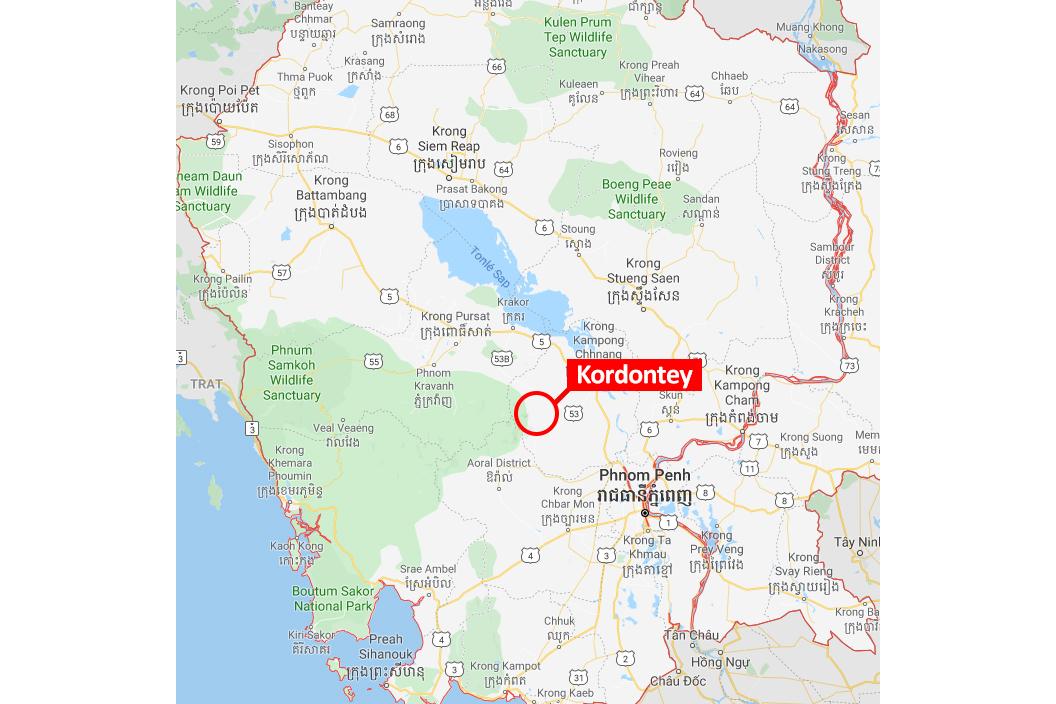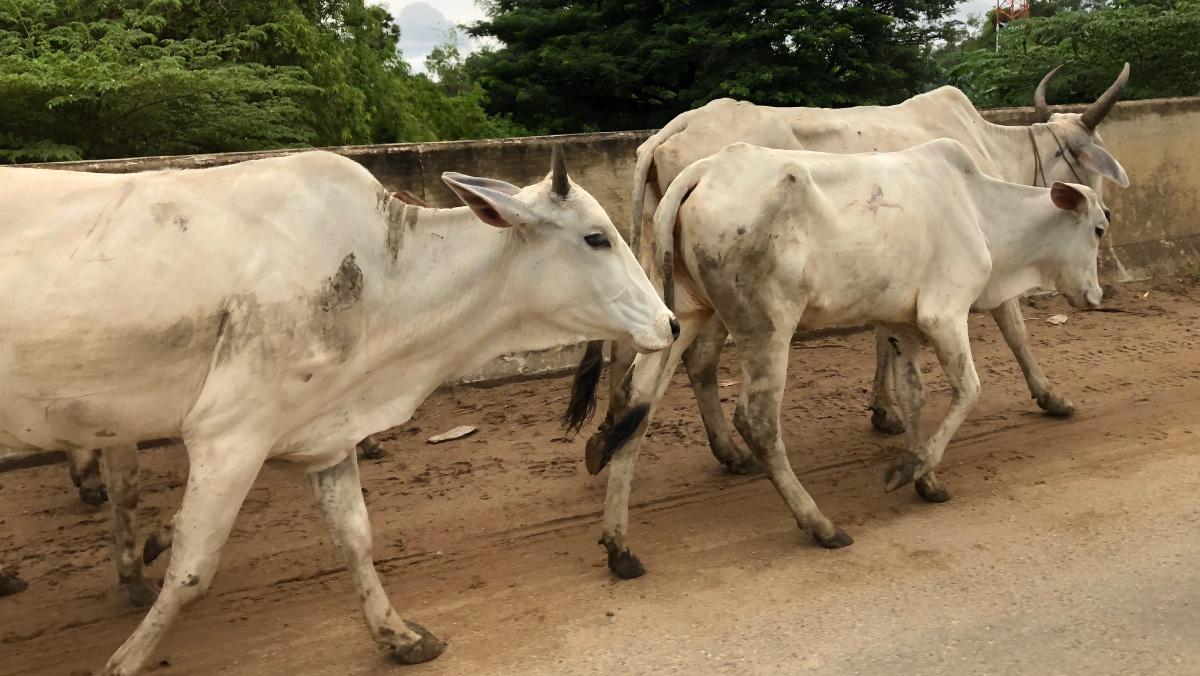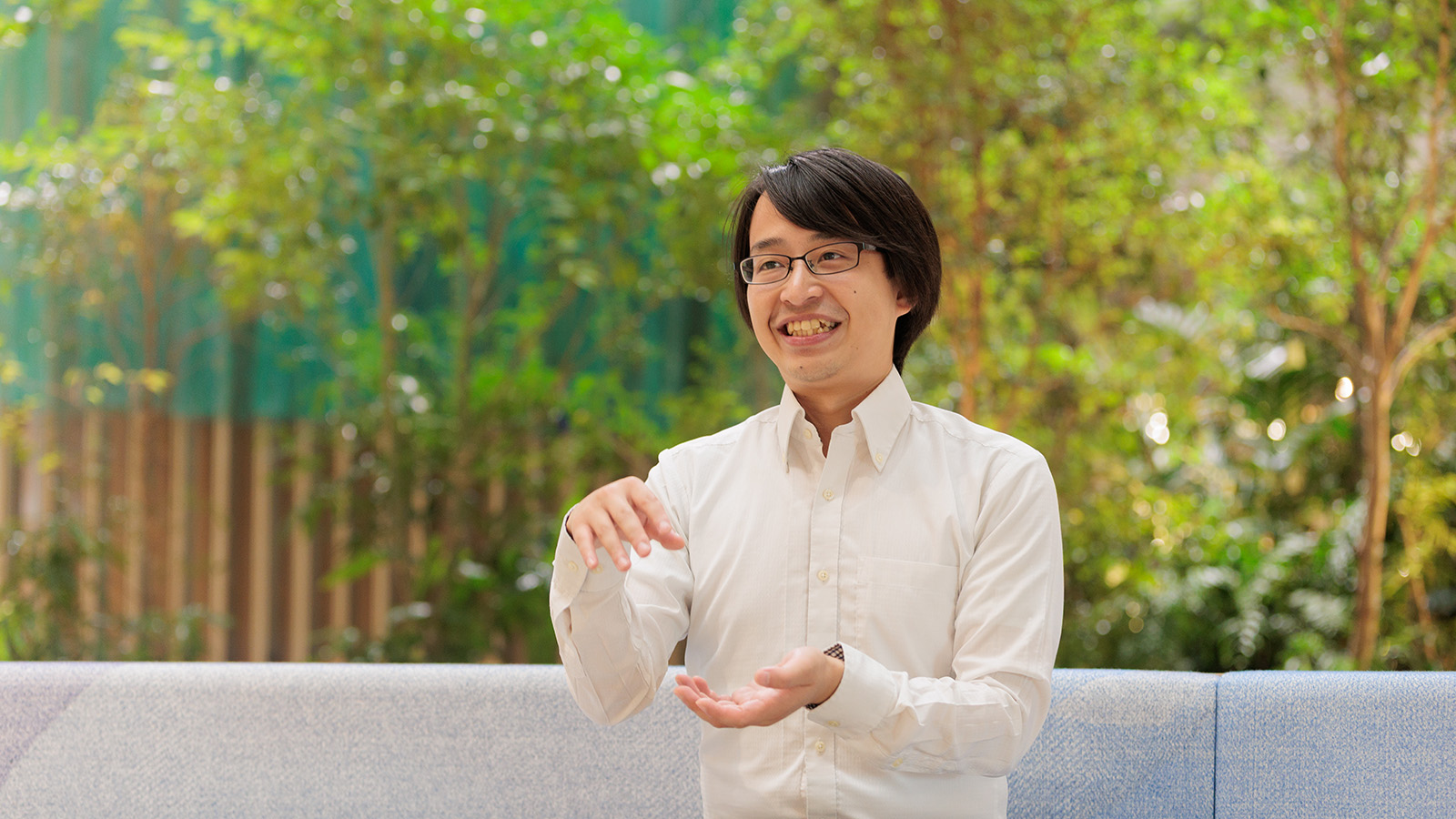
There are said to be about 1.1 billion people in the world living without electricity. With its 100 Thousand Solar Lanterns project, through January 2018 Panasonic has provided light in the form of solar lanterns to regions without electricity, primarily in Asia and Africa. For this feature, we visited the Cambodian village of Kordontey to find out how those lanterns are benefiting peoples' lives. All of the people of the village welcomed our group with lighthearted smiles, and told us of the joy of having light and their hopes for the future that lay ahead.
Summary
- Even in Cambodia, which continues to post high economic growth of 7% per year, there are still many people who live without electricity.
- Panasonic has provided light in the form of solar lanterns to the lifestyles of these people.
- This light is used for children to study in the evenings, and for adults to work, raising incomes and helping to improve the standard of living.
- Panasonic will continue to collaborate with various organizations and institutions that are familiar with these local problems to help everyone enjoy a vibrant, inclusive society.
Those Left Behind Despite High Economic Growth of 7% Annually
We disembarked at the airport in Phnom Penh, Cambodia's capital, in September 2019. Heading into the city by car, we got stuck in a major traffic jam - a regular phenomenon in the emerging countries of Asia. Looking out the window we could see a vast number of cranes, each stretching to the sky; the city is experiencing a construction boom, as mostly foreign investment - from China, Korea, Thailand, Vietnam and others - fuels urban development projects and the rise of new skyscrapers and commercial buildings. Phnom Penh is in the very midst of high economic growth.
Our trip would take us through the lively city of Phnom Penh and about three hours by car to Kordontey, a village where many homes still live without electricity. For the first two hours or so, the view out the window was of suburbs and towns, but for the last hour, the roads got rougher as we traveled through stretches of barren marshland. From time to time, farmhouses could be spotted along the route.
We finally reached Kordontey, which turned out to be a small village of closely-packed, tin-roofed houses. A total of 271 people live here in 63 households.

Many houses are simple structures with board walls and thatched roofs, and sanitation is generally poor. A panel that powers a solar lantern is placed on the roof to charge.
Walking along the village road in the evening, one frequently encounters herds of cows. Children of the village drive the herds back from pasture and make their way home. Many families in the village raise cows and pigs, and make a living by selling their livestock.
Children Study Eagerly Under the Light of a Solar Lantern
As the sun starts to set on this village without streetlamps, small lights begin to shine, first in one house and then another. The solar lanterns provided to the villagers begin to illuminate their homes.
We visited one such home. Inside was a raised floor made of wood, where two young girls sit doing their homework, looking at their textbooks and taking careful notes. The rest of the room is dark, so they sit close together under the light of the solar lantern as they work.
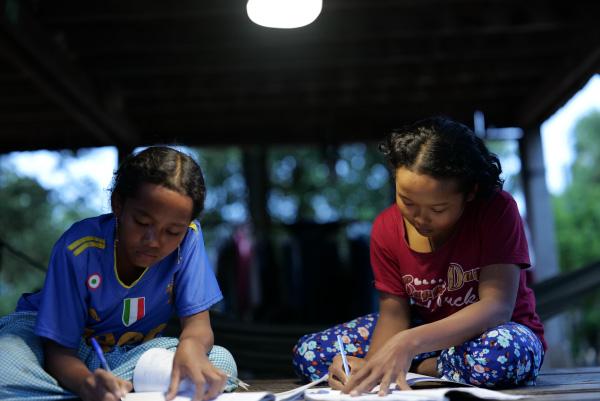
Children studying under the light of a solar lantern. They told us they dream of continuing in school and someday taking up a profession.
The girls tell us they are both in the fifth grade of elementary school. They say the solar lantern has made it possible for them to study for hours at a time. Asked if they enjoy studying, one girl says yes, shyly replying that she hopes to study to become a schoolteacher someday. The girl next to her immediately pipes up, "I want to be a doctor!" They both see that a clear path to their desired professions lies in their futures if they study.
Keeping a friendly eye on the girls is their father, the head of the household. We asked him how their lives had changed with the solar lantern, and this was his reply.
"The best thing is that we can now eat together as a family. We used to have to eat while it was still light outside, but with the lantern we can cook whenever we like, and wait for everyone to come home before we eat," he said with a big smile. "The lantern is also useful when I go to check on the cows in their shed, which I do about twice a night. It used to be very dangerous venturing out alone in the pitch dark."
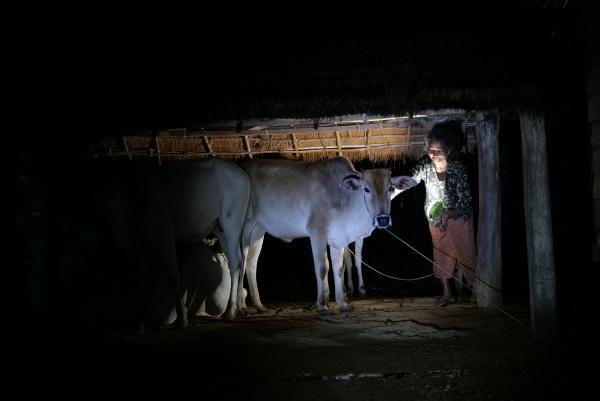
The solar lantern is useful when venturing out at night to check on the cows in their shed.
A sweet smell drifts over from another house. We drop by to find a woman cooking something under the light of a lantern. She says she is making banana chips. "I sell them in the village," she tells us, sounding happy as she explains, "Thanks to the lantern I can do other work during the day and make them at night, which means I have more income." We ask how she will use the extra money, and she replies, "First I'll buy food, then use the rest for my children's education."
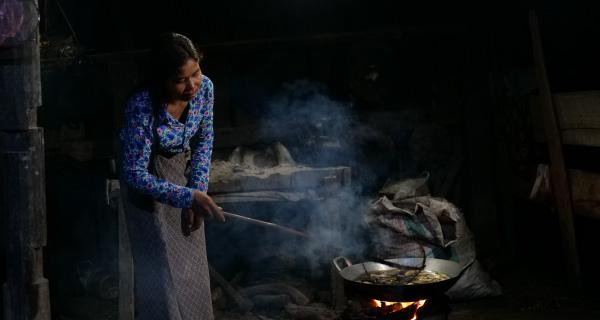
A woman making banana chips for sales. Using the solar lantern enables her to work in the early hours when it is still dark, and she says her income has increased as a result.

Her banana chips are a popular item in the village; she sometimes sells several dozen bags a day.
Taking the Initiative to Create a Future for the Village
We happened to visit on the day of a village meeting. About 30 people assembled in a meeting house on the outskirts of town and began talking about how the village is run. Solar lanterns were hung from pillars in each of the four corners of the room, providing enough illumination to light up the space. The meeting was being run by a staff member of Life With Dignity, an NPO that is supporting improvements in the village's living conditions.
"What are some of the issues for this village," he began by asking, "And what can be done to solve them? Let's hear your opinions." Five or six people responded to his call by offering their opinions and wishes: "I raise vegetables, so I'd like a reservoir for shared use." "I'd like someone to build a common toilet." "We'd like to jointly purchase seedlings for our crops." While the discussion was not very orderly, there seemed to be a lively exchange of ideas. Ultimately, eight requests were written on the board, with the NPO staff promising to take them back to the main office to consider whether they could be accomplished.

At the village meeting; a lively exchange of ideas took place regarding how to improve village life.
At the end of the meeting, Noriko Tanaka, head of Panasonic's CSR & Citizenship Department, was called to the stage to say a few words. "Our wish is that the solar lanterns we have provided will help improve everyone's lives," she said. "We hope you use them for a long time." The villagers showed their appreciation by offering a hearty round of applause.
Once the meeting was over, we spoke with a gentleman who had been particularly outspoken during the discussion. He turned out to be the principal of the village's elementary school.
"I became a teacher in Kampong Speu and was then sent to this village. I married a woman from the village and now I live here. Coming from the outside, I really want to help improve life in the village. I'd like to see people not only sell livestock, but gain a stable income from farming. To do that, we first need a reservoir for shared use. At my school, we work with the children to grow vegetables - please come and visit if you have time." His words tumbled forth in a rush, filled with hope and determination at the thought of taking the initiative to build a future for his village.
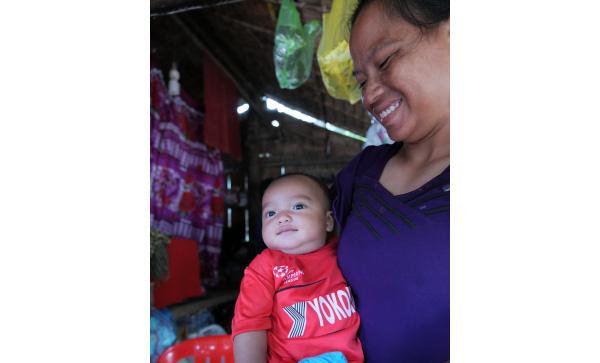
A mother and her child in the village. The child smiled at us with his adorable eyes, and we look forward to seeing how the village will change by the time he becomes an adult.
Toward a Vibrant, Inclusive Society for All
The AKARI: Bringing Light to People Project Takes on a New Challenge
Panasonic began its 100 Thousand Solar Lanterns project in 2013, working to bring light to regions in emerging and developing countries with poor or no electricity. As of January 2018, Panasonic's 100th anniversary, the company had donated in excess of 100 thousand lanterns to 30 countries in Asia and Africa through 131 organizations and agencies.
In Cambodia, Panasonic has worked with about 20 organizations to donate approximately 13,000 lanterns since 2014. One of those groups is Life With Dignity, the NPO that also provides support to Kordontey, the village we visited for this report. We visited their office in Phnom Penh to speak with program coordinator TRY Kong.
"We work to improve the lives of people living in challenging conditions. We help the vulnerable in society, including the disabled and women, to earn a living, assist in building strong, disaster-resistant communities, and provide guidance to assure that those who leave their communities to earn money can do so safely."
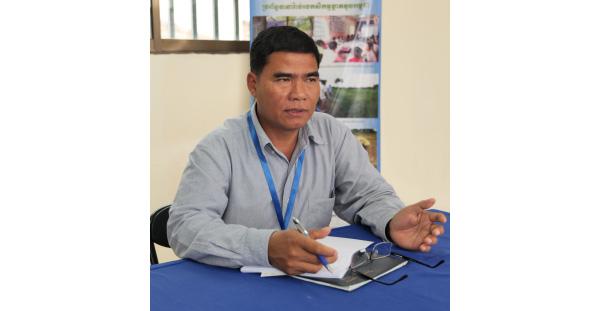
TRY Kong, program coordinator at the Phnom Penh headquarters of Life With Dignity.
Mr. Kong goes on to explain some of the problems facing Kordontey and other villages they support.
"One issue is education. Poor families cannot afford to send their children to school. While Cambodian statutes call for nine years of compulsory education beginning at age six, many children do not even make it to elementary school. Those who do find that, as they move up in grade level, there is more work to do at home. This makes it difficult for them to keep up with their studies, and eventually they stop going to school."
According to the Ministry of Foreign Affairs of Japan, the enrollment rate for Cambodian elementary schools (grades one through six; ages six through 11) is about 77%. For middle school (grades seven through nine; ages 12 through 14) the rate falls to about 42%, and for high school, to about 20%. Attendance rates at the university level (higher education) are between 0.7 to 1.0%. These are overall figures that include urban areas, so for rural areas such as Kordontey, the rates are presumed to be significantly lower.
Still, the introduction of solar lanterns appears to be bringing a change to the rural education issue. Mr. Kong continues:
"We are very grateful to Panasonic for providing us with solar lanterns. Children are able to spend longer hours studying under the light, and their parents are happy that their children are able to keep up with their studies. We expect a greater number of these children will go on to high school and college as a result."
Aside from education, these villages deal with numerous other issues. These include medicine and savings, and religious offerings. These are particularly difficult when the absolute income is low. Against this background, wise use of solar lanterns make it possible to tend to livestock during the night, and make banana chips to increase income and raise the standard of living.
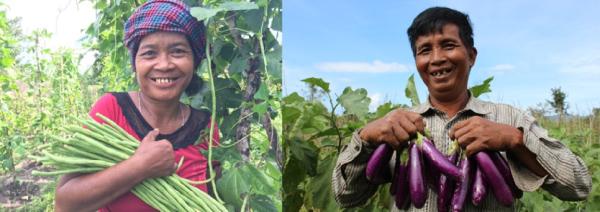
The villagers' goal is to increase agricultural work, etc., so that family members no longer need to leave to make money.
"Ultimately, the future of the village is in the villagers' hands. We work to communicate and deepen our bonds with them, devoting our efforts to the village's development. We look forward to the continued support of our friends in Japan," said Mr. Kong.
Enhancing Employee Awareness of Their Role as Corporate Citizens
The 100 Thousand Solar Lanterns project got off to a new start in 2018 as the AKARI: Bringing Light to People project, the greatest feature of which is the expansion of activities to include not only Panasonic employees but also the general public.
Panasonic's Noriko Tanaka says she senses a greater awareness among employees of their role as corporate citizens, noting that, "Many employees had expressed an interest in participating in the project, so in 2014, we created a scheme that would allow them to donate their employee benefit cafeteria points to the solar lantern project. In four years, approximately 4,300 employees have donated, sending 3,500 solar lanterns. In 2016, we began sending employee volunteers to villages receiving donations of lanterns, dispatching 12 employees to three countries over three years. We get more than 100 applications for each opportunity."
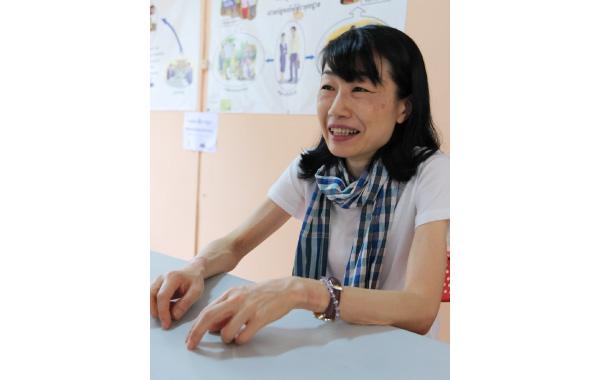
Noriko Tanaka, head of Panasonics CSR & Citizenship Department.
In February 2019, Ms. Tanaka accompanied four employees on a visit to a village in Cambodia's Kampong Cham Province. The employees were deeply impressed to see mothers in their 30s to 50s gathering for a literacy class, studying eagerly late into the night under the light of a solar lantern.
Ms. Tanaka says that, "Out of the darkness, one mother after another, carrying their children, gathered in the classroom with their solar lanterns. They say they want to study because, unless they can read, they cannot find good jobs or may be easily cheated. When they were young, they could not go to school even if they wanted to, and that is why they are studying so hard now in the hopes of increasing their incomes and improving their lives."
Those who participated commented on their home page and Facebook, "This made me keenly aware of the power of light," and "I realized how useful the light can be, and how happy it made the people there," sharing the significance of the AKARI project as a company-wide effort.
The general public can participate in the project through the Used Book and Disc Donations program. If 5 or more unneeded books are donated, they will be picked up free of charge, and the money raised from their sale will be donated. Using this easy method of participation, between March 2018 and March 2019, approximately 23,000 books were donated. These donations resulted in 90 new solar lanterns being sent to Cambodia.
Thanks to donations collected under the AKARI: Bringing Light to People project, solar lanterns are being donated to households in Cambodia supporting disabled dependents.
The Key to Success is Partnerships
What is the key to corporate social contribution efforts? Ms. Tanaka says that partnerships are especially important.
"We emphasize support for education, health, and employment for women, but the type of social issues and assistance needed in fact varies greatly across regions and countries. NPOs and United Nations agencies know more about circumstances in regions without electricity in Asia and Africa than anyone else; so which organizations we decide to partner with becomes a very important issue."
Ms. Tanaka looks to the future, noting that, "Panasonic appreciates the support of NPOs and UN agencies, which are familiar with local problems, and they are important in our efforts to conduct responsible activities. Through our wide-ranging partnerships, we hope to continue in our efforts to create a vibrant, inclusive society for all."
- Reproduced from the website "Mirai-kotohajime," by courtesy of Nikkei Business Publications, Inc.
# # #
- Disclaimer:
- We would like to note that Panasonic Newsroom is not a place to address personal Customer Service issues. Even though this is not the forum, Panasonic is always eager to resolve your concerns. Our local customer services contacts can be found at Global Support or you can see our list of Social Media Accounts to find the right channel for your queries and concerns.
Related Links
Related News
- Panasonic Launches Off-grid Solutions Project in Myanmar to Celebrate Its 100th Anniversary (Jul 16, 2018)
- [Press Release] Panasonic Launches Off-grid Solutions Project to Mark Its Centenary (Apr 23, 2018)
- Panasonic Fulfills 100 Thousand Solar Lanterns Project in its 100th Anniversary, Bringing Light to Off-grid Communities Globally (Jan 30, 2018)

